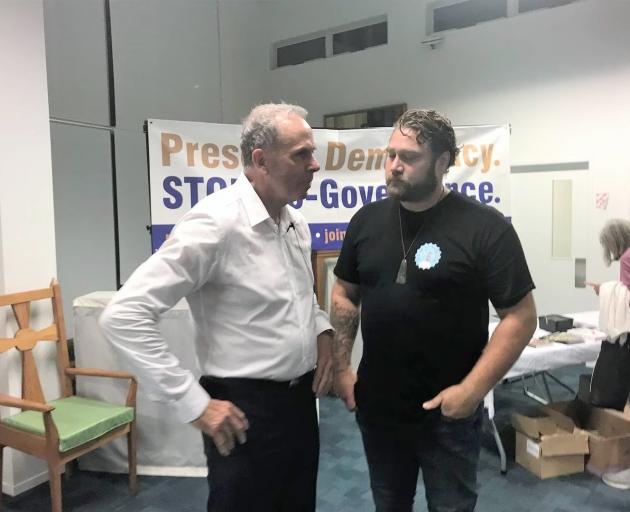

Julian Batchelor is currently conducting a nationwide "Stop Co-governance" tour — scheduled to reach Otago and Southland in June and July — of 42 scheduled talks about how "elite Māori" are conspiring to wrest control of New Zealand.
Labelling policies that endorse Māori as Treaty partners as "apartheid", Batchelor twists the concept of co-governance, and then takes this to the extreme.
Co-governance is a shared governance arrangement wherein the Treaty of Waitangi/Te Tiriti o Waitangi partners have equal seats around the decision-making table.
Co-governance is not about reluctantly handing over ownership. It’s about partnership in management, and is a crucial part of the Crown meeting its obligations under Te Tiriti.
Batchelor is using the debate around co-governance as a Trojan horse through which he challenges any threat to the hegemony of European culture in Aotearoa. Under the guise of democratic free speech, Batchelor’s campaign utilises fear and ignorance to embolden and make explicit people’s inability and unwillingness to engage with inclusivity, complexity and diversity when it comes to political and social issues.
I grew up firmly, and uncomfortably, ensconced in New Zealand’s evangelical Christian community. I learned the basic tenets of evangelicalism — the importance of a personal relationship with Jesus Christ as the way to salvation, the necessity of evangelism (sharing the gospel) and so on.
I also witnessed the less savoury aspects of evangelicalism — the espousal by some of bigotry and intolerance, sexism, homophobia, intolerance and a hatred of immigrants, feminists, liberals, communists, secular humanists and the government, to name a few.
Obviously not all evangelicals hold the latter views. But there are those, Batchelor included, who utilise the rhetoric and tactics they have honed on the evangelical preaching circuit to further their own ends.
Batchelor and his ilk view the world in a simplistic way. Every single thing — every person, belief, action, theological doctrine or governmental policy — may be divided into two neat categories. Good vs evil; Christian vs secular; right vs wrong. There is no room for nuance or complexity, and to give even an inch — to listen and meaningfully engage with the "other side" — is to submit to the secular, to the "outside world", to sell out one’s beliefs.
Batchelor’s whole evangelical schtick is one of warfare and white masculinity, as outlined in his book Evangelism: Strategies from Heaven in the War for Souls. He approaches co-governance and anything related to te ao Māori in the same way. New Zealand is, according to Batchelor, a nation at war.
Batchelor’s emotionally charged language provokes knee-jerk reactions and reduces the complexity of co-governance down to a few simple, intellectually dishonest talking points that provoke outrage and division.
This binary, militaristic framing of the social, cultural and political landscape is further illustrated by the overlap between Batchelor’s movement with other fringe conspiracy groups.
In recent years, many evangelicals have developed what is commonly known as a "persecution complex", the belief that they are being unfairly targeted or persecuted for their religious beliefs. This belief has been fuelled by a variety of factors, including changing cultural norms, legal battles over same-sex marriage and abortion, and perceived attacks on religious freedom.
Batchelor’s simple and palatable delineation of right and wrong is immensely reassuring to his audiences, many of whom are older, conservative Pākehā fearful of social and cultural change.
His polarising language amplifies a sense of "us vs them" and offers fearful listeners their own brand of truth and protection.
Batchelor is a charismatic and engaging speaker. In my various encounters with Julian as a child and teenager, I perceived the overly aggressive and coercive nature of his approach to Christianity.
I am under no illusion regarding my ability to influence or educate Batchelor. In fact, my criticism will probably embolden him; it will amplify his "righteous" anger and feed his rapacious persecution complex. As historian Kristin Kobes Du Mez points out, "If history teaches us anything, it is that militant white evangelicalism thrives on a sense of embattlement."
It’s up to us to challenge Batchelor’s dishonesty and views on race. Here I must acknowledge the incredible mahi of the Aotearoa Liberation League and other grassroots collectives with their organisation of in-person protests.
As they point out, "racists embolden one another", and if not challenged, "this behaviour becomes more normalised".
Community halls, churches and other venues that have agreed to host Batchelor’s talks need to consider whether they are comfortable endorsing and platforming his divisive rhetoric. Trusted faith leaders and community organisers also need to step forward and combat this misinformation.
Finally, media literacy, and a more comprehensive account of New Zealand’s history and how it affects the contemporary political, social and cultural landscape, needs to be prioritised in our educational facilities.
Guard your credulity — Julian Batchelor is coming to town. Don’t let him poison every mind he encounters.
- Jean Balchin, a former English student at the University of Otago, is studying at Oxford University after being awarded a Rhodes Scholarship.













